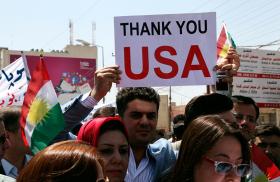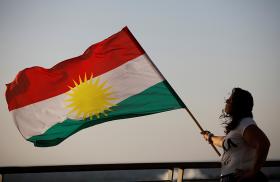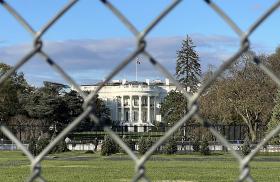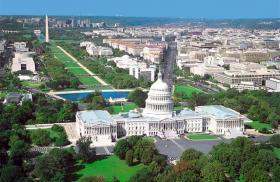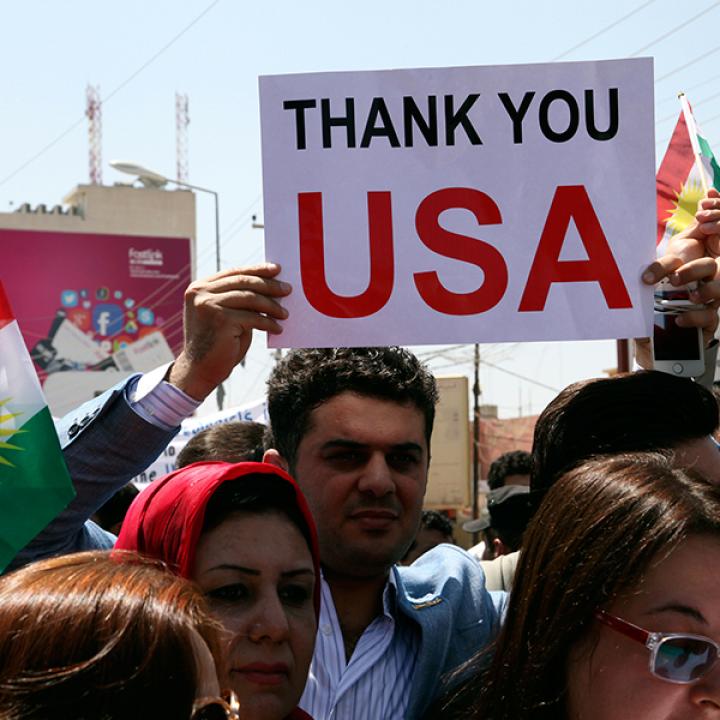
- Policy Analysis
- PolicyWatch 3614
The KRG Turns Thirty: The Future of U.S.-Kurdish Relations in Iraq

Part of a series: The KRG Turns Thirty
or see Part 1: The KRG Turns Thirty: The Future of U.S.-Kurdish Relations in Iraq (Part 3)
On the anniversary of the Kurdish region’s first election, three experts take stock of the bilateral relationship and internal political and economic challenges.
On May 17, The Washington Institute held a virtual Policy Forum with Bilal Wahab, Amberin Zaman, and Vance Serchuk. Wahab is the Institute’s Wagner Fellow and founder of the Center for Development and Natural Resources at the American University of Iraq-Sulaimani. Zaman is a senior correspondent with Al-Monitor, focusing on politics and minority rights in Iraq, Syria, and Turkey. Serchuk is executive director of the KKR Global Institute, an adjunct senior fellow at the Center for a New American Security, and a former professional staff member on the Senate Homeland Security and Governmental Affairs Committee. The following is a rapporteur’s summary of their remarks.
Bilal Wahab
After coming to life in 1992 as a byproduct of other events in Iraq, the Kurdistan Regional Government (KRG) gradually became a Middle Eastern nation-building experiment for the United States. And despite the popular narrative of Kurdish victimhood, the manner in which Kurds have exercised power during the past three decades shows true agency. The story of Kurdish self-governance in Iraq is one of maintaining resilience, but also of seizing—and losing—opportunities.
Kurdish independence was jumpstarted by Iraq’s invasion of Kuwait and subsequent expulsion by the U.S.-led coalition. Seeing Saddam Hussein’s regime weakened, Iraqi Kurds rose up against him. Afterward, fears of his retaliation spurred 1.5 million Kurds to flee to the mountains, resulting in a humanitarian crisis that compelled Washington and the UN to create a safe haven in the north.
On May 19, 1992, Kurds voted in their first election. Within two years, however, the KRG’s ruling parties started a Kurdish civil war that did not end until Washington intervened in 1998.
When the United States invaded Iraq in March 2003, the KRG became the northern front after paratroopers landed near Erbil. The fall of Saddam increased Kurdish powers and rights, many of which were enshrined in Iraq’s new constitution. Later, the KRG held its second election in 2005 and exported its first barrel of oil through Turkey in 2009.
Kurdistan’s durability has been tested repeatedly in its third decade of existence. In 2011, protestors took to the streets against KRG corruption and party monopolies. In 2014-2017, the Islamic State’s military offensives and other activities threatened KRG territory. Iraqi Kurdistan still faces challenges today, most notably a reduced budget, internal political divisions, and threats of Iranian and proxy attacks.
Amberin Zaman
To begin this discussion, one must acknowledge that the term “the Kurds” is misleading. Kurds have been dispersed between different nation-states for decades, and while there is a common identity in being “Kurdish,” it is more relevant in thought than in practice.
The Kurdistan Democratic Party (KDP) is one of the most influential of all Kurdish groups but is rivaled by the Kurdish entity in northeast Syria. Indeed, to truly measure the KRG’s success, one must take stock of what is happening with other Kurdish groups. Journalists tend to give the Kurds and the KRG a pretty easy ride, so to speak—a bit of bias is evident given the hardships the world has seen Kurdish groups endure over the years. Yet it is time to move beyond that narrative. The Kurds are no longer victims and should not depict themselves as such. The Kurds are a determined and resilient people who have made tremendous sacrifices and were one of the driving forces behind Saddam’s overthrow, among other achievements.
Moreover, it is inaccurate to treat 1991 as the starting point for relations between the United States and the Kurdish people in Iraq. The relationship predated the KRG’s official formation and included very close interactions between Kurdish leader Mustafa Barzani and the CIA.
The KRG’s relationship with Turkey has fluctuated over the years. Ankara became extremely nervous when the United States helped empower the Iraqi Kurds in 1991, bristling at the potential implications for Kurds in Turkey. Yet the Turkish government did help the KRG stand on its own two feet economically by allowing it to export oil across the border.
The KRG’s core problem today is Kurdish disunity. These divisions are not new; in fact, they speak to the tribal nature of the Kurds and how the personalities of leaders often drive politics. The 2017 independence referendum reinforced that there is no monolithic Kurdish identity, and the KRG suffered significant losses as a result of that crucial vote. The longstanding internal divisions can also be seen within the new generation of aspiring Kurdish political leaders. At a time when the KRG aims to project political maturity, its parties are increasingly run as dynasties, alienating the populace and spurring many Kurds to leave for other countries because they feel they are unable to get ahead in life. The Kurds will continue to survive as a group because of their resilience, but the KRG’s survival depends on depersonalizing political relationships so that they can last beyond the current leaders.
Finally, one should not discount Russia’s role in Iraq, where Moscow has invested over $10 billion. The situation will change when secondary sanctions are applied due to the Ukraine crisis, with some implications for the Kurds. Yet the crisis also gives the KRG a window of opportunity to help fill the energy gap left by Russia. Perhaps this is a chance for all Iraqi Kurdish factions to come together and advance the KRG’s economic and political standing.
Vance Serchuk
The Kurdish people continue to enjoy a broad base of bipartisan support and sympathy in the United States, though American politicians and citizens do not necessarily pick up on some of the nuances that apply within Iraqi Kurdistan or across Kurdish groups elsewhere in the Middle East. On a psychological level, Americans tend to like underdogs, and the hardships that have befallen the Kurds over the decades only increase this sentiment.
This sympathy began to grow in earnest following the 1991 Gulf War, when American power was brought to bear in Iraq, Saddam’s army was weakened, and the Kurds saw an opportunity to gain some agency. With U.S. support, a dictator was pushed back from territory he had previously controlled, and a minority group had the opportunity to govern itself. What followed was a long string of moments when the United States found itself involved in the region and the Kurds positioned themselves as crucial allies.
Today, however, America is broadly withdrawing from the Middle East, and the U.S. role there will be different, with profound implications for Iraqi Kurdistan. During the KRG’s first thirty years, U.S. assistance was crucial to its success and protection, but its future survival will depend on how the Kurds govern.
Even so, it is important to recognize the tremendous progress Iraqi Kurdistan has made since the KRG was founded. The fact that one can fly into an international airport in Erbil is a tremendous thing. These and other achievements should not be taken for granted—a fact that becomes all the more glaring when you travel just a few hundred miles away from KRG territory.
At the same time, however, thousands of residents have been leaving the Kurdish region for Europe, indicating that fundamental problems persist. Although some people argue that these issues are caused by internal disunity or lack of independence, many core problems stem from the fact that the KRG’s government is patronage-based and rife with corruption. This type of governance has repeatedly failed to create jobs for young people or foster competitive politics. Additionally, the space for free media has been diminishing due to growing political pressure. Such an environment is a proven formula for losing your best and brightest to other countries.
Indeed, praising the achievements of the U.S.-Kurdish partnership is no longer enough—one must also be willing to have tough conversations about Iraqi Kurdistan’s politics and economics, which are not on a good course. The past decade has been particularly troubling. The KRG is more corrupt, less free, and less economically dynamic than it was ten to fifteen years ago. We need to discuss why that is. Only the people of Iraqi Kurdistan can change the current dynamic.
This summary was prepared by Margaret Dene. The Policy Forum series is made possible through the generosity of the Florence and Robert Kaufman Family.



